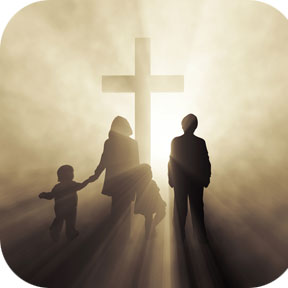As I looked over this week’s readings, one word came to mind. That word was “why?” The readings, especially the second and the gospel, begin to answer that important question. I believe that the failure to answer that question before has led to great problems in our church.
 For example, I always believed that one of the reasons why living together became popular in the sixties is because no one could give a good reason why Catholics should not live together other than that it is a sin. The reason was there, but although I am sure many Catholics understood it, I don’t believe they were able to verbalize it. The why was not answered. So if you take the concept of sin and throw it out the window, then there is no reason not to co-habitate before marriage, if sin is the only reason why you otherwise would not.
For example, I always believed that one of the reasons why living together became popular in the sixties is because no one could give a good reason why Catholics should not live together other than that it is a sin. The reason was there, but although I am sure many Catholics understood it, I don’t believe they were able to verbalize it. The why was not answered. So if you take the concept of sin and throw it out the window, then there is no reason not to co-habitate before marriage, if sin is the only reason why you otherwise would not.
However, when you look at today’s readings, you can see not only an understanding of the why of that question, but all the why’s related to other questions of Catholic morality.
Let’s look at the question again. Many people may say there is nothing wrong with co-habitation, but if you ask the question, why shouldn’t I live with someone before marriage, you can find the answer in Paul’s words.
Through him we have received the grace of apostleship,
to bring about the obedience of faith,
for the sake of his name, among all the Gentiles,
among whom are you also, who are called to belong to Jesus Christ;
to all the beloved of God in Rome, called to be holy. (Romans 1 NIV)
You and I through our baptism have been set apart and have the vocation to live our faith in a way that becomes a sacramental presence, a sign and a symbol of the truth of the Gospel message for all humanity.
You can say, everyone else is doing it; but not everyone else has been baptized or has embraced their baptismal call. The reason why you cannot do what everyone else is doing is because Christ has called you to be a light, his light in the world.
This goes for everything else we teach of about Catholic morality. This message comes to us over and over again in the gospels. We have been set apart. Those around us may embrace secularism, but you and I cannot.
Jesus makes an interesting remark elsewhere in the gospels where he says if your light is in darkness, then how dark must your darkness be. If you are called to be the light to be reflecting Christ’s light through you and you instead reflect the darkness of the world by embracing secularism, then how dark will the world become?
When we go back to Paul’s letter, we see his service to Christ. He calls himself a slave of Christ Jesus, now what he means here is that he has given up his own will to do that which will bring all to come to know the gospel. It does not mean that he is literally a slave. He recognizes that he has been set apart in service to God and in this case to the gentiles, the non-Jews. He has suffered terribly because of this, yet, this does not phase him because he is focused on the greater prize which is not only his own salvation but yours as well.
As we approach Christmas in two days, we will be hearing the famous Christmas carols calling Jesus our king. But is He? Have we given our allegiance to him at all costs, or is this the time we are nice to each other because that is the secular philosophy. Christmas is a nice time to celebrate, but it does not mean anything if we are not committing ourselves to Christ. Indeed, we can complain about the secular forces denying Christ and calling that green lighted symbol a holiday tree, but if we are not living our lives in a way that reflects Christ then we are doing the same thing. We are calling ourselves of Christ, but are just as secular as a holiday tree.
The Wall Street Journal this week had a great editorial on the two Christmases. One in which we celebrate the birth of Christ and other the party tradition. The writer, John Steele Gordon, explains that the party tradition is ancient and goes back to the Roman celebration of Saturnalia recognizing the winter solstice. The religious tradition goes back to the Council of Nicea. They come together on December 25th but they are actually two different celebrations. Considering that we actually celebrate both in our lives the secular and the Christian holiday and holyday respectively, which one has the greatest affect in our lives.
What makes us different in our celebration of Christmas than those who do not believe? These are the questions we need to ask ourselves and not only ask them in December but also in February, June and November.
Everyone else may be doing it, but not everyone else is a baptized and committed Catholic. There is some fascinating news coming out of Germany, where previously it was believed that the Catholics were just like every other German in the 20th Century. We find that is not the case, the Catholics were against the NAZI’s they spoke out against their policies and now we learn that although the Germans are religious, those most embracing their faith in Germany are the Catholics.
Can the same be said for those of us here in the United States, are the Catholics living their faith? How seriously are we taking our faith and does it show? One good sign is the great persecution we have suffered over the past several years. However, that does not mean anything if we cave to it.
How much do you believe that Jesus is the messiah and how ready are you to defend that truth against those trying to silence your voice? These are the questions we need to also ask ourselves during Christmas.
 Remember, we are part of the kingdom of God. We have an allegiance that is different from others. We have a calling different from others and so we must live our lives in a way that demonstrates that difference, in service, in morality and in love. If we are not doing any of that, then we are offering lip service at best or lying at worst. Yet, if we are seeking to offer to the world our living of the mandates of Christ our king, we are committing a revolution act that brings a vision of Christ to the world, that the world may embrace or reject, but otherwise would never see.
Remember, we are part of the kingdom of God. We have an allegiance that is different from others. We have a calling different from others and so we must live our lives in a way that demonstrates that difference, in service, in morality and in love. If we are not doing any of that, then we are offering lip service at best or lying at worst. Yet, if we are seeking to offer to the world our living of the mandates of Christ our king, we are committing a revolution act that brings a vision of Christ to the world, that the world may embrace or reject, but otherwise would never see.
Photocredits:

